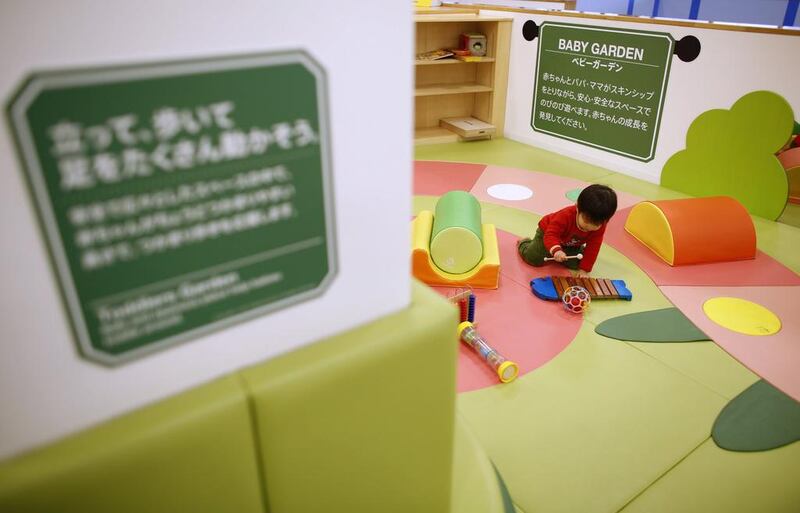An increasing number of big companies in Japan are launching their own child-care centres to attract and retain female employees faced with a shortage of day care services.
"Sixty-six per cent of women of working age were in the workforce" in 2016, says Chihiro Masai, legal affairs section chief in the child-care department of Japan's ministry of health, labour and welfare (MHLW).
Those women with infants and toddlers need to put them in child care while they are working.
The Tokyo-based hospital and care provider Nichii Gakkan, with 95,000 employees, has already opened 48 facilities this year. The company plans to have opened a total of 100 centres by the end of next year, says the firm's public and investor relations official Yoko Daitoh.
Promoting the nursery business, supporting the rearing of the children of the company's and affiliated companies' employees as well as other children in the community, and resolving the problem of waiting lists at nursery schools are the reasons Ms Daitoh gave for Nichii Gakkan wanting to get into the child-care business.
Government subsidies Nichii Gakkan, and more than 500 other firms, receive for child-care services cover about 75 per cent of costs for acquiring and equipping the facilities, as well as operating expenses according to the number of children served and other considerations. "Extra day care that keeps children beyond the normal nursery time, as well as evening nursery, will get further subsidies," Ms Daitoh says.
The nursery care provider Doronkokai has been opening about 15 child-care centres a year, according to the company public relations official Tomoya Hirose. "We need to hire about 400 new employees" every year, Mr Hirose says.
In an interview with Bloomberg recently, the electronics store chain Bic Camera discussed its plans to open its first child-care facility last May using government subsidies. Located in a condominium building in Tokyo, the facility hosts 30 children, company resources manager Hiromi Kinoshita said.
"We are getting more women and mothers as employees," Ms Kinoshita said.
"We found out some leave us to focus on child-rearing, and we are starting this so that they will stay with us without quitting," she said, according to Bloomberg .
MHLW figures show that out of 23,447 child-care centres currently in the country, 1,236, or about 5 per cent, are company facilities. Regardless of whether it is a private company or not, the government's policy is to encourage firms to enter the child-care business. However, the government stopping subsidies and leaving child care to the free market at the moment is out of the question, Ms Masui says.
"As the number of nursery schools is presently insufficient, we are not considering ending subsidies," she says.
The Foundation for Child Well-Being has been charged by the Japan Cabinet Office for handling MHLW subsidy applications from private nursery schools. As of March 30, the corporation has granted ¥21.3 billion (Dh706.1 million) for maintenance costs to 770 facilities with a total capacity of 19,000 children, said uniformity support division senior manager Tomohiro Sasage.
Also as of March 30, the corporation granted a total of ¥2.9bn to 240 facilities with a total capacity of 4,600 children, Mr Sasage says. "Based on the provisions of the company-initiated nursery school subsidy implementation outline, we judge whether they meet staff placement standards, equipment standards, etc and make a grant decision," he says.
If corporate child-care centres can fare well, non-corporate ones struggle to compete with highly subsidised, low-priced nurseries. The private nursery school Love Clover Nursery (LCN) is a case in point. The nursery is located in the Setagaya district of Tokyo Prefecture, which Ms Masui says is the area with the longest child-care waiting list in the country.
LCN charges about ¥130,000 a month per child for its services, depending on age, days a week and number of hours in care. Despite Setagaya's long nursery school waiting list, LCN loses children every April to drastically lower-priced licensed public nursery schools, says its president Shiho Tomisawa.
This year, LCN had 28 children before April but only nine now remain. "Although we strive to be an attractive nursery school with a variety of curricula, our high fees are a big stumbling block," Ms Tomisawa says.
As a non-licensed private child-care centre, LCN presently receives no subsidies from the national or ward governments. The nursery is presently seeking to change its status to a licensed establishment. With licence approval, it will receive each month between ¥80,000 and ¥100,000 from the ward, plus child-care fees of between ¥10,000 to ¥40,000 per child from the parents.
Licensed nurseries also receive rental and maintenance subsidies. However, any expense outside what licensing provides, such as staff costs, must be covered by the nursery itself. "So even with those subsidies, managing the nursery school will be difficult," Ms Tomisawa says.
To ensure the quality and safety of child care, supervision by government agencies, local authorities and other public institutions should continue, says the Chiba University's Graduate School of Social Sciences professor of public policy Akiko Oishi.
Child-care centres are also needed in low-income and low population locations which private organisations and private enterprises avoid, says Ms Oishi, who specialises in female employment and child well-being as well as the effect of social security policy on labour supply of the elderly. "Only public licensed nurseries will deal with this need, so it is undesirable to completely eliminate them," she says.
As the number of child-care centres is increasing, child-care safety and the decline of child-care quality are becoming big issues, so increased government oversight of child care is essential, Konan University Hirao School of Management professor Masako Maeda tells The National.
"Fourteen children 0 years old went missing during nursery care last year," says Ms Maeda, who specialises in population studies, social security and social policy.
"On the other hand, not only inspections but also support for improvement is required," Ms Maeda says.






